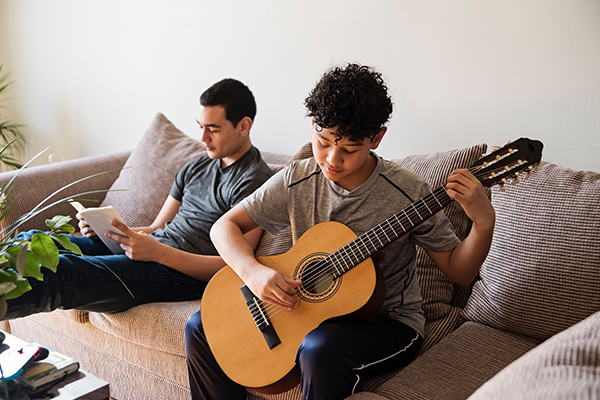Teenager Growth & Development: 13 to 18 Years (Adolescent)
Call today to schedule an appointment with one of our pediatricians.
Growth and Development during Teenage Years
Teens going through puberty will have many changes in their developing bodies, as well as advances in their social and emotional growth.
There is a broad range of time in which kids hit puberty-related growth spurts:
- Most girls start their sexual development between ages 8 and 13 (the average age is 12) and have a growth spurt between ages 10 and 14.
- Most boys start their sexual development between ages 10 and 13 and continue to grow until they’re around 16.
How much will my adolescent grow?
The teenage years are also called adolescence. Adolescence is a time for growth spurts and puberty-related changes. An adolescent may grow several inches in several months followed by a period of very slow growth, then have another growth spurt. Changes with puberty (sexual maturation) may occur gradually, or several signs may become visible at the same time. Some teenagers experience these signs of maturity sooner or later than others.
What changes occur during puberty?
Sexual maturity and other physical changes during puberty are a result of hormonal changes. In boys, it is difficult to know exactly when puberty is coming. There are changes that occur, but they often occur gradually, rather than as a single event.
Girls experience puberty as a sequence of events. Each girl is different and may progress through these changes differently. The following are average ages when puberty changes may occur:
- Beginning of puberty: 8 to 13 years
- First pubertal change: breast development
- Pubic hair development: shortly after breast development
- Underarm hair: 12 years old
- Menstrual periods: 12 years old on average; normal range is 10 to 15 years old
Boys also experience puberty as a sequence of events that typically begin later than girls. While each male adolescent is different, the following are average ages when puberty changes may occur:
- Beginning of puberty: 9 to 14 years old
- First pubertal change: enlargement of the testicles
- Penis enlargement: approximately one year after the testicles begin enlarging
- Pubic hair development: 13.5 years old
- Nocturnal emissions (or “wet dreams”): 14 years old
- Facial and underarm hair, voice changes and acne: 15 years old
What does my adolescent understand?
The teenage years bring many changes, not only physically, but also mentally and socially. During these years, adolescents increase their ability to think abstractly and eventually make plans and set long-term goals. Each child may progress at a different rate and may have a different view of the world. In general, the following are some of the abilities that may be evident in your adolescent:
- Thinks more abstractly
- Concerned with philosophy, politics and social issues
- Thinks long-term
- Sets goals
- Compares oneself to their peers
As your adolescent begins to seek independence and control, many changes may occur. The following are some themes that may arise during the adolescent stage:
- Developing independence from parents
- Peer influence and acceptance becomes important
- Romantic or sexual relationships become important
- May show long-term commitment in relationship
How to Communicate with a Teenager
Teens essentially communicate as adults, with increasing maturity throughout high school. As teens seek independence from family and establish their own identity, they begin thinking abstractly and become concerned with moral issues. All of this shapes the way they think and communicate.
During this period, teens spend much of the day outside the home — at school or at after-school activities or jobs and with their friends. But it’s important to try to talk with your teen every day to share opinions, ideas and information. Here are a few tips to help you communicate with your teen:
- Make time during the day or evening to hear about your teen’s activities; be sure that he or she knows you are actively interested and listening carefully.
- Remember to talk with your teen, not just at them.
- Ask questions that go beyond “yes” or “no” answers to prompt more developed conversation.
- Take advantage of time during car trips to talk with your teen.
- Make time for sporting and school events, playing games and talking about current events.
Language Development in Teenagers
Teens should be able to grasp word meanings and contexts, understand punctuation and form complex syntactic structures (how words are put together). Communication is more than the use and understanding of words, though — it also includes how teens think of themselves, their peers and authority figures. Explanations may become more figurative and less literal. Teens will also comprehend abstract and figurative language, such as similes, metaphors and idioms.
When should you seek help to improve your teen’s language skills?
To understand your teen’s overall language skills and progress, make sure to have ongoing communication with their teachers. If the teachers suspect a language-based learning disability, comprehensive testing will be necessary. This can include a hearing test, psychoeducational assessment (standardized testing to assess learning style as well as cognitive processes) and speech-language evaluation.
Parents often feel that the teen years are a time of difficult communication, when it’s normal for teens to challenge parents and resist authority. But behavior that causes severe disruption in the household may not be normal teen rebellion. If you feel that your relationship is particularly trying, talk about it with your child’s doctor.
How can I help my adolescent develop socially?
- Consider the following ways to foster your adolescent’s social abilities:
- Encourage your adolescent to take on new challenges.
- Talk with your adolescent about not losing sight of themselves in group relations.
- Encourage your adolescent to talk to a trusted adult about problems or concerns, even if it is not you they choose to talk with.
- Discuss ways to manage and handle stress.
- Provide consistent, loving discipline with reasonable limits, restrictions and rewards.
- Find ways to spend time together.

Fitness for Teenagers from 13 to 18 Years
As kids enter their teen years, they might lose interest in physical activity. Between school, homework, friends and even part-time jobs, they’re juggling a lot of interests and responsibilities. But regular physical activity can help your teen feel more energetic, improve focus and attention and promote a better outlook. Regular physical activity can also help your teen maintain a healthy weight and prevent heart disease, diabetes and other medical problems that come later in life.
Fitness in the Teen Years
Physical activity guidelines for teens recommend that they get a minimum of 1 hour of moderate to strong physical activity daily. In addition:
- Most of the physical activity should be aerobic, where they use large muscles and continue for a period of time. Examples of aerobic activities are running, swimming and dancing.
- Any moderate to strong activity counts toward the 60-minute goal.
- Teens can be active in sports and structured exercise programs that include muscle- and bone-strengthening activities.
- If your teenager is interested in weight training, this should be under supervision of a qualified adult.
Motivating Teens to Be Active
Parents should give teens control over how they decide to be physically active. Emphasize that it’s not what they do — they just need to be active. Given the opportunity and interest, teens can get health benefits from almost any activity they enjoy — skateboarding, touch football, yoga, swimming or dancing.
All teens should limit the time spent in sedentary activities, such as watching TV, playing video games and using computers, smartphones or tablets. Motivating teens to trade sedentary activities for physical activity can be the toughest part. Once teens get started with physical activity, however, many enjoy the feelings of well-being, reduced stress and increased strength and energy they get from exercise. As a result, some begin to exercise regularly without nudging from a parent.
Help your teen stay active by finding an exercise plan that fits with their schedule. They may not have time to play a team sport at school or in a local league, but most teens can work physical activity into everyday routines, such as walking to school, doing chores or finding an active part-time job. Gyms may also be an option, as many gyms offer teen memberships. Some teens might feel more comfortable doing home exercise videos or exercise video games (like tennis or bowling). These can be good options, but it’s important to do daily moderate to strong activities too.
When to Speak With Your Doctor
If you’re concerned about your teen’s fitness, speak with their doctor. These are some instances where your teen’s doctor may need to get involved:
- If your teen is overweight or very sedentary, they might need to start physical activity slowly, Their doctor may be able to help you make a fitness plan or recommend local programs.
- If your teen has a chronic health condition or disability. Your teen should not be excluded from fitness activities, but you should talk to their doctor about which activities are safe. Some activities may need to be changed or adapted, and some may be too risky depending on the condition.
- If your teen is overdoing it. There can be pressure for young people in sports to lose weight or gain muscle using dangerous substances. Talk with your doctor if you have concerns.
- If your teen complains about pain during or after sports and exercise.
How long should my teenager sleep?
Getting the right amount of sleep is important for anyone who wants to do well on a test or play their best in sports. Unfortunately, many teens don’t get enough sleep. Most teens need about 8-10 hours of sleep each night.
Teenager sleep patterns are different from those of adults or younger kids. During the teen years, the body’s circadian rhythm (an internal biological clock) is reset, telling your teen to fall asleep later and wake up later. This change is likely due to the brain hormone melatonin, which is released later at night for teens than it is for kids and adults. This can make it harder for teens to fall asleep early.
Check out our Healthy Sleep Tips for Teens for more info.
Reviewed by Dr. Gregory Kennedy, SOCPA | CHOC Primary Care
June 2021
